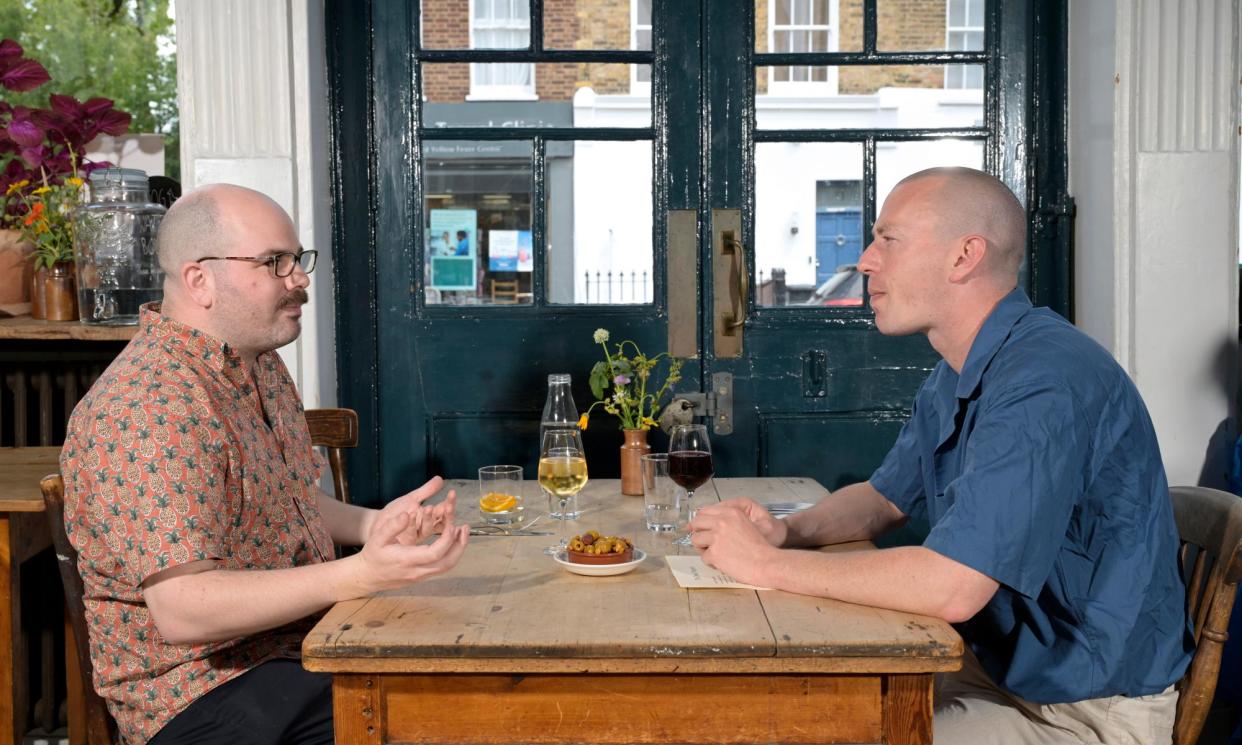Dining across the divide: ‘There’s a trend of: work is a pain, and I’ll just fit it in around the rest of my life’

Stephen, 36, Manchester
Occupation Railway engineer
Voting record Most recently Green, always progressive
Amuse bouche Stephen was in the 2012 Olympics opening ceremony as a grubby waistcoated Victorian dragging away fields to make way for industrialisation
Dan, 34, London
Occupation Chief executive of a company that does everything connected to death: wills, funerals, probate
Voting record Would rather not say, likes to keep politics out of work
Amuse bouche His superpower is guessing how much stuff fits inside things: “like how many grapes would fit inside a car – I’ve always won things at fairs”
For starters
Dan It’s a really nice pub famous for organic food. I had a steak, Stephen had vegetarian food; very predictable, four-day-week communist eating vegetables! We immediately got on. I had a margarita, a glass of wine, a pint. I was going to a wedding afterwards; I guess I just started early.
Stephen Dan came full of contagious energy. The man is a force, a live wire. We quickly made an agreement that we were going to go for it. He ordered a vermouth. I thought, “That sounds nice, let’s do the same.”
Related:Dining across the divide: ‘I think the electric car is going to be the most enormous white elephant’
The big beef
Dan It was about working culture and the four-day week. A lot of people in my company are under 30. At its best, work is a place where you get a sense of belonging and community and identity. But on a national level, there is this trend of: work is a bit of a pain in the arse, and I’ll just fit it in around the rest of my life, and move around between different careers. I think that’s bad for people’s confidence and wellbeing.
Stephen The culture in the UK is that we do too much. Giving people more headspace is going to improve their mental health and wellbeing. We’d have more time to do things like sit on the school PTA, organise a fete, whatever it is you’re into. South Cambridgeshire council took part in a four-day week trial. And because it became an enticing job, they actually saved money because they were spending less on temps and contractors. It sounds counterintuitive: you do less and get more.
Dan That’s not exactly a revelation – you’re less likely to quit if you get paid five days’ salary to work four days. The organisations in these studies don’t have competition. The best news I could get is if one of my competitors started working a four-day week. It also makes it more difficult to compete on a global level. The UK used to be the best in the world at so many things. What does it stand for now? It’s unclear what the economic or industrial strategy is, and that’s against the backdrop of people wanting to work less.
Stephen When we talk about being left behind, embedded within that there’s an idea of competition and that links with this neoliberal notion that we must have continuous economic growth. Infinite growth is unsustainable. And maybe it’s not the end of the world if another company – or another country – grows faster than us.
Sharing plate
Dan We both have engineering backgrounds and are big fans of Victorian engineers. We spent about an hour talking about maintaining railway tracks and pouring concrete.
Stephen We are similar in the way we approach things. We like solving problems, and are interested in systems. But he’s taken that into building a very successful company, by the sounds of it.
For afters
Dan On working from home, I think we agreed that going to work is better for productivity and creativity, especially when you’re working as a team. There are more opportunities for feedback and just to pick up on the skills that you see from other people around you.
Stephen It’s a nuanced individual and organisational thing. Obviously, you can’t drive a train from home. I come into the office, more often than not. That boundary helps me: this is the place I do work, and once I step away, I can do other things.
Takeaways
Stephen I feel a bit awkward talking about our differences, because it was very genial. It’s rare to have the chance to sit down with someone for a couple of hours. Neither of us checked our phones the whole time we were there.
Dan Stephen is a lovely guy. We swapped numbers, took a photo together, carried on chatting afterwards on WhatsApp. It was a delight. Oh, and on the way from the pub I bumped into Tom Daley. I said: “Are you Tom?” He said, “Yes!”
Additional reporting: Kitty Drake
• Stephen and Dan ate at the Duke of Cambridge in London.
Want to meet someone from across the divide? Find out how to take part


